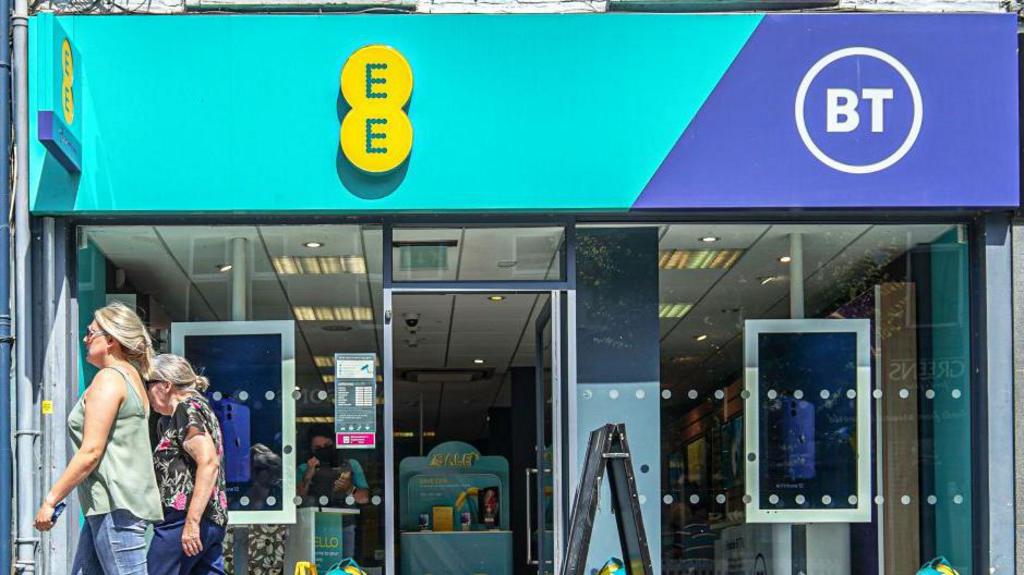A network outage that affected thousands of EE and BT customers has been resolved, according to a company spokesperson.
The disruption left numerous customers unable to make or receive calls across both mobile and landline networks.
While some users reported difficulties contacting emergency services, the government has confirmed that 999 call functionality has “now been restored.”
A representative from BT, the parent company of EE, issued an apology for the outage, stating that the company has “resolved the problem and the service is running as normal.”
In a statement released late Thursday, the spokesperson attributed the issue to “a technical fault impacting voice services on our network earlier today.”
Downdetector, a service that tracks outages based on user-submitted reports, registered over 2,500 EE customers experiencing disruptions at 14:00 BST, with widespread reports indicating issues across multiple networks.
Vodafone and Three have both confirmed to the BBC that their networks were unaffected by the outage.
While other networks experienced spikes in reported outages on Downdetector, these were likely attributable to customers on those networks being unable to connect to EE or BT phone numbers.
Social media platforms were flooded with user reports detailing the loss of EE and BT mobile and landline services.
BT initially advised customers to use 999 as normal.
However, Devon and Somerset Fire and Rescue Services alerted the public via social media on Thursday afternoon to “a fault with the mobile phone network, including 999 calls.”
They later issued an update on X at 15:01 BST, confirming that 999 call services had been restored to normal.
South Western Ambulance Service subsequently posted on X to corroborate the existence of the issue.
The Department of Science, Innovation and Technology acknowledged that the outage had “impacted some customers’ ability to make and receive calls between EE and other networks.”
The department further stated that “EE and BT digital voice calls to 999 have now been restored.”
A spokesperson for the department added: “Communications providers have statutory obligations to ensure their networks and services are appropriately resilient.”
EE and BT customer service phone lines were reportedly down for a significant portion of Thursday afternoon.
One customer took to an EE forum to report being unable to access the helpline to arrange an “urgent refund,” while another customer was unable to connect on behalf of elderly parents who had placed an order with EE.
Ofcom, the UK’s communications regulator, has stated that it is in contact with BT “to establish the scale and cause of the problem as soon as possible.”
Ernest Doku, a mobiles expert at Uswitch, commented: “Mobile networks and landlines are vital to reach essential and emergency services, it’s important for customers to be reconnected as soon as possible – and kept up to date with developments.”
“If your landline stops working, you will be entitled to compensation if it has not been fixed within two days, but make sure to report the issue to your provider as soon as it happens,” he added.
The disruption may have also affected customers of mobile phone operators that “piggyback” on EE’s network, with 1pMobile acknowledging awareness of issues “affecting a small number of customers.”
The company stated: “We apologise for any inconvenience caused and the EE network engineers are working on the issue currently.”
Lyca Mobile and Spusu have been contacted for comment.
BT Group serves over 30 million customers in the UK and reported £20.4bn in revenue for the last financial year.
There are less than 50 K8 phone boxes across the UK.
North Yorkshire Council wants BT to reconsider its plan to close more than 90 local phone boxes.
People in rural Cumbria are concerned about losing their analogue phones, which work in a power cut.
BT wants to remove the facilities from Kirton in Lindsey and Barrow upon Humber.
A trade union says staff in Londonderry were not consulted before they were told 140 jobs are at risk.

